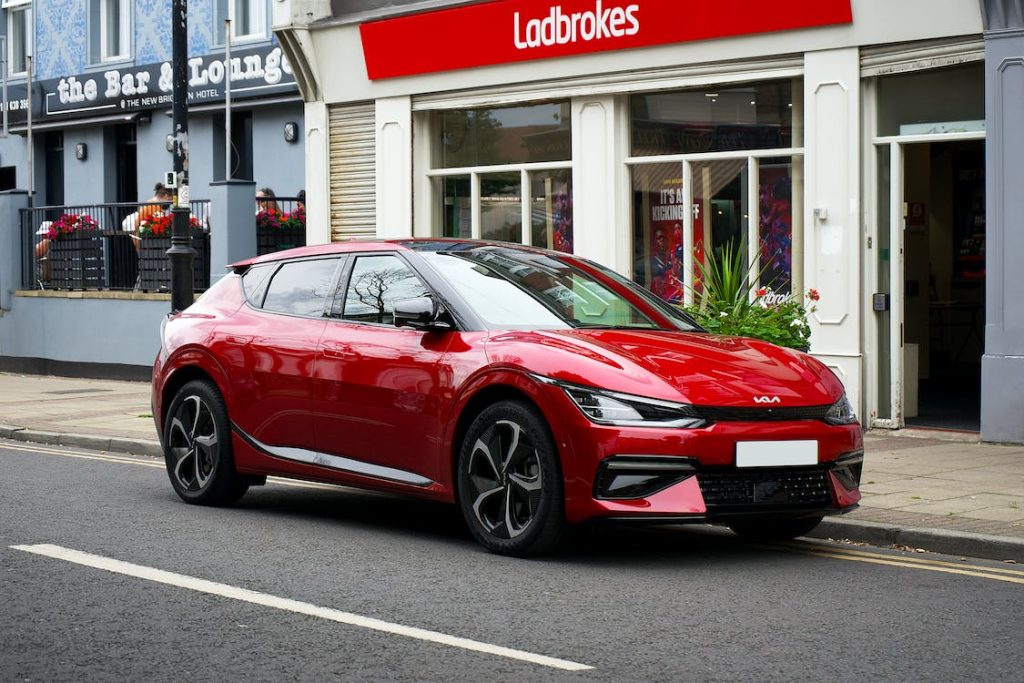In 2022, South Korea’s automotive sales rose in single digits, primarily due to moderate supply disruptions of semiconductor components used to make cars. Data showed that five local automakers sold a total of 7,396,674 automobiles globally. The figure is an increase of 4.0 percent compared with the prior year. Although car purchases within South Korea fell by 3.1 percent, exports jumped 5.6 percent to 6,008,198 units outside the country’s borders.
Aside from the usual gas-powered cars, South Korea’s automobile industry also offers electric vehicles in the market. And one of the leading South Korean electric vehicle manufacturers is Kia Motors. The company offers a wide range of models with unique features and advantages.
What is a Kia Electric Car?
Kia electric cars are an increasingly popular form of transportation. They are powered by either a rechargeable battery or hydrogen fuel cell and produce zero emissions. On average, electric vehicles (EVs) have a driving range of around 170 miles. Some, like the Kia Niro EV and Kia Soul EV, can go even further — up to 280 miles. Taking into account that most journeys are less than five miles long, it is obvious how often one will need more distance for a single trip in one year: not very often at all. In other words, EVs can cover nearly all conceivable car trips almost every time.

Different Types of Electric Vehicles
As electric vehicle growth in the market continues to progress in leaps and bounds, a vast array of vehicle types are available, including anything from small cars and sedans to sports utility vehicles (SUVs) and pickup trucks. Some EVs run on electricity only, while others have an electric motor and an internal combustion engine. Here are the types of EVs available in the market.
Battery-Powered Electric Vehicles
A battery electric vehicle (BEV) is an environmentally-friendly, fuel-efficient car that runs exclusively on electricity. These vehicles come with a rechargeable long-range battery pack. These all-electric autos have the potential to travel up to 100 miles per charge or more for certain models – talking about 200 to 300 miles in some cases! With BEVs, you can enjoy an eco-conscious journey while going further than ever before.
Hybrid Electric Vehicles
Hybrid electric vehicles (HEVs) combine an internal combustion engine and electric motors powered by battery packs for the utmost efficiency. Hybrid vehicles offer remarkable fuel economy without compromising performance. The battery is charged through regenerative braking and utilizing a smaller internal combustion engine. The extra power its motor provides can also run auxiliary loads or reduce idling when stopped for extended periods. All these features working in tandem allow hybrid electric cars to provide increased efficiency with no detriment to their output.
Plug-In Hybrid Electric Vehicles
Plug-in hybrid electric vehicles (PHEVs) utilize batteries to activate an electric motor and can be recharged externally. To further increase their range, they include a compact combustion engine that will either recharge the battery or provide direct power for the wheels – depending on model design.
PHEVs provide an optimal solution for people looking to reduce their gasoline consumption and emissions. Depending on the model, these vehicles can run up to 50 miles in electric mode with a fully charged battery – perfect for short trips! As if that wasn’t enough savings already, studies show PHEVs use anywhere from 14 percent to 47 percent less fuel than conventional cars when batteries are at full capacity. Plus, you won’t have to worry about being stranded without electricity: PHEVs can always switch over and run solely on gas when needed.
Fuel Cell Electric Vehicles
Fuel cell electric vehicles (FCEVs) make use of a highly effective electrochemical process to turn hydrogen into electricity, which then powers their electric motor. Contrary to popular belief, these FCEVs are not rechargeable from external sources. Instead, they are fueled with compressed hydrogen gas stored in a tank on the vehicle itself.
Unlike their conventional counterparts, FCEVs have the extraordinary benefit of creating no emissions from their tailpipes. With FCEVs, you’ll never need to worry about running out of fuel again. Hydrogen gas is stored in a tank on the vehicle, and refills are completed within four minutes, just like an ordinary internal combustion engine! Moreover, these vehicles have a driving range exceeding 300 miles per refill.
Benefits Of An Electric Vehicle (EV)
Hybrid vehicles started entering the market in 1999, and within a decade, plug-in electric vehicle sales began in 2010. Sales of hybrid vehicles accounted for 3.2 percent of the market for light vehicles in 2013. The market share increased to 5.5 percent in 2021. On the other hand, sales of all-electric cars got a 3.2 market share in 2021.
The increasing market share was due to the numerous advantages the vehicles have over other types of cars. Here are some benefits offered by electric vehicles.
Fuel Economy
Electric vehicles boast remarkable fuel efficiency due to high-performing electric drive components. When measuring their fuel economy, electric cars use kilowatt-hours (kWh) per 100 miles or miles per gallon of gasoline equivalent (MPGe). Depending on usage, modern light-duty all-electrics can exceed an astounding 130 MPGe while driving up to 100 miles consuming a mere 25 to 40 kWh.
HEVs are known to have greater EPA fuel economy and cheaper costs than their standard vehicle counterparts. Moreover, the efficiency of medium-duty or heavy-duty all-electric cars and PHEVs depends on the load they carry and their duty cycle – but in certain targeted cases, these electric motors prove more cost-effective than conventional ones.
Cost
When it comes to electric vehicles, while they usually have lower energy costs compared to their conventional counterparts, the purchase price tag can be hefty. However, with production ramping up and batteries improving each day, these prices will soon even out. Furthermore, you won’t only save money on fuel. But you may also receive a federal tax credit and state and utility incentives – helping offset your initial investment!
Electric car owners can take advantage of the Qualified Plug-In Electric-Drive Motor Vehicle Tax Credit from the federal government when buying a vehicle from manufacturers that still need to meet certain thresholds. This tax credit can amount to $2,500 to $7,500, depending on the size and battery capacity of your car. Additionally, some states offer additional incentives found within their laws and incentives database.
Batteries
Electric vehicle batteries are designed to last for a lengthy period but will eventually reach their end of life. Some manufacturers offer warranties that ensure the battery lasts up to eight years and 100,000 miles. The National Renewable Energy said current electric car batteries perform optimally in moderate climates with an estimated lifespan of 12 to 15 years. However, extreme climates may reduce their life expectancy to 8 to 12 years.
Emissions
Switching to an electric or hybrid vehicle has the potential to reduce emissions compared to a traditional gas-powered car drastically. An all-electric model produces no tailpipe pollution, while plug-in hybrids (PHEVs) don’t emit anything when powered by electricity alone. Their effectiveness depends on the specific make and type of system incorporated into each vehicle design.
Leveraging electricity from low-emission sources will result in lower life cycle emissions for electric vehicles, making them a more practical choice when compared to gas or diesel-powered cars. Choosing an EV over conventional fuels can help reduce the environmental impact and create a cleaner future.
Electric vehicles may not have a clear environmental advantage if your region heavily relies on traditional electricity production.
Kia Electric Cars
The Kia EV is becoming increasingly popular in the vehicular market due to its unique combination of luxury and energy-saving features. They are also affordable compared to the market leaders in the United States, such as the Tesla Model Y Crossover.
Types of Kia Electric Vehicles
Kia offers three distinct types of electric vehicles in the market. The BEV is an all-electric version of a conventional car. This category includes the Kia Niro and Kia Soul. You can recharge these cars with an external charger or regenerative braking technology.
Unlike BEVs, HEV combustion engines emit relatively higher emissions. However, the electric motor coupled with the gas-powered engine provides more power and speed for an efficient ride. The motor is only charged with regenerative braking to ensure a smooth journey!
You might consider plug-in hybrid electric vehicles (PHEVs) for a longer-range journey. These operate with gas and electricity but can be charged externally, unlike the traditional hybrid electric vehicle (HEV). This makes them perfect for those who need to make long trips or commute regularly.
In recent years, sales of hybrid vehicles have skyrocketed as the charging infrastructure is being developed and upfront costs are decreasing. As these factors continue to improve, BEVs will continue to draw more consumers.
Key Features Of Kia Electric Cars
The features offered by Kia electric cars vary depending on the model, but some standard features come with all models.
Battery and Electric Motor
At the heart of every Kia electric car is an innovative rechargeable battery and powerful electric motor, which deliver superior performance and efficiency. The alternative fuel technology on the 2023 EV6 increases its range up to 310 miles. Similarly, the 2022 Kia Niro EV has an EPA estimated range of 239 miles.
Regenerative Braking Technology
Kia cars also feature advanced regenerative braking technology that captures energy from deceleration to help recharge the car’s battery, making them more efficient and reducing the amount of time drivers need to spend recharging.
Car Safety and Convenience
Kia cars are designed with a range of safety and convenience features, including advanced driver-assistance systems such as lane-keeping warning systems, autonomous emergency braking, blind spot monitoring, and rear cross-traffic alert. They also feature parking assistance technologies.
Popular Kia Electic Car Models
The popularity of Kia electric cars is on the rise. With their sleek designs, stylish interiors, and efficient performance, they are a great option for those looking to reduce their carbon footprint. Here are some popular electric cars from the South Korean manufacturer.
1) 2023 Niro EV
The 2023 Niro EV is an all-electric subcompact SUV with a higher horsepower number than its hybrid counterparts. It also features an interior designed with distinctive styling and digitized instruments.
Kia further emphasizes their commitment to sustainability by integrating recycled materials into the design. With up to 253 miles range, thanks to its 64.8-kWh battery, you can get from 10 percent charge up to 80 percent in about 45 minutes when connected conveniently to a DC fast charger! The 201-hp electric motor provides enough power for front-wheel drive acceleration – mild yet responsive – perfect for your everyday needs.
The Niro EV features driver-centric Dual Panoramic Displays, voice recognition commands, and a head-up display. Its smart cruise control system automatically modifies your speed to help keep a set distance from the vehicle in front of you. Moreover, it can also use navigation data to forecast an imminent bend and make alterations as needed for safe driving.
The EV also has a spacious interior and cargo space. Additionally, the heat pump makes sure that your battery remains warm in frigid driving conditions, thereby preserving its range and keeping it running at optimal performance. The MSRP of the 2023 Niro EV starts at $39,550.
2) 2023 Kia EV6
Kia America introduced the 2023 Kia EV6 into the electric vehicle market with its sporty driving dynamics and daring design. The rear-wheel drive of this all-electric crossover is its core, but all-wheel drive variants boast greater power and can come with an expanded battery pack that provides up to 310 miles of range.
This Kia SUV car model also offers comfortable seat space for five adults and a cargo space of up to 50 cubic feet. It also features a premium quality interior using sustainable materials. On top of this, it has surprisingly excellent handling for an SUV, which makes it even more enjoyable on winding roads.
The 2022 Kia EV6 already offered good value for people looking for an electric vehicle. So, with the 2023 Kia EV6, you will get even more features, improved performance, and better efficiency – all at an affordable price. The manufacturer’s suggested retail price (MSRP) of the Kia EV6 starts at $48,700.
3) 2023 Kia Sorento Plug-in Hybrid
The 2023 Kia Sorento Plug-in Hybrid is a premier family vehicle in the slowly growing market of plug-in hybrids. They come with all the standard features you would expect from an SUV, such as three-row seating, All Wheel Drive, and various entertainment and safety technologies. The 2022 model of this Kia Sorento car was awarded IIHS Top Safety Pick, making it one of the safest choices for families out there.
This Kia hybrid comes with heated second-row seats and a heated steering wheel. It also has genuine leather upholstery and ventilated front seats. EV buyers can also experience a seamless integration of their compatible smartphone with Android Auto and Apple CarPlay in the EV. They can do this while keeping their device charged using its wireless smartphone charging feature. The vehicle also features five USB ports for owners to use. The other features offered by the 2023 Sorento EV include a blind spot warning system, automatic high beams, and automatic emergency braking technology. The MSRP for the 2023 Kia Sorento Plug-in Hybrid starts at $49,990.
Conclusion
To recapitulate, Kia electric vehicles offer a variety of features and benefits that make them an attractive option for those looking to reduce their carbon footprint. There’s something for everyone in this growing market. Those who want luxury combined with performance can try out the all-electric 2023 Kia EV6. It has excellent handling and advanced driver assistance technologies and can reach up to 310 miles on one charge! Ultimately, you will find the perfect electric vehicle from Kia regardless of your needs or budget.





